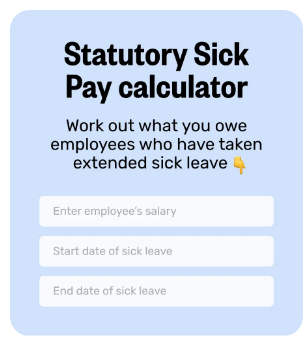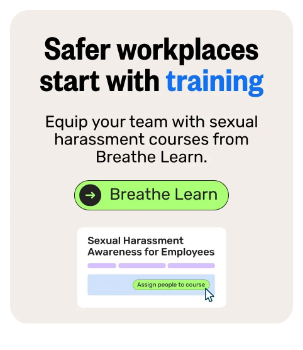Introduction to employment law
This section provides an overview of employment law for employers. Employment law governs the rights and responsibilities of employers and employees. From contracts and discrimination to redundancy, grievance procedures, and flexible working, keeping up-to-date is essential to avoid risks and support workplace wellbeing.
UK employment law is detailed, but accessible with the right support - especially when changes occur twice yearly in April and October.
That’s why getting some good employment law advice is super important for everyone involved. It helps both employers and employees get a clear picture of what they can and cannot do in the workplace.
The UK has a pretty solid set of rules when it comes to employment law, covering all the big topics like unfair dismissal, working hours, and holiday entitlement.
Plus, there are employment law services out there (just like the Breathe Partner network) ready to give expert advice and support on all sorts of issues, so both employers and employees can feel confident about their rights and obligations.
We’ve also got lots of guides and templates, to help make it easier to get to grips with what employment law updates are out there.
Employment contracts
Employment contracts are a big deal when it comes to employment law. They spell out the essential details of what both employers and employees are signing up for.
Every employee must receive a written statement of employment outlining:
- Leave entitlements (including holidays, maternity leave, paternity leave, and sick pay)
- Trade union rights (forthcoming)
Changes to employment terms must follow consultation and notice protocols under the Employment Rights Act 1996.
These contracts should cover the basics like job title, what the job involves, and how many hours you’ll be working, so everyone knows what’s expected.
Employers have to hand over a written statement that lays out the important stuff like pay, holiday entitlement, benefits, and how much notice you need to give if you’re leaving.
If there are any changes to the contract, employers need to play fair, give you a heads-up, and explain what’s happening to keep things clear and honest.
If you want to switch up your working hours or maybe work from home, you can ask for flexible working arrangements. Employers have to take these requests seriously and let you know why if they can’t make it work.
Some contracts might also have clauses to keep things confidential and protect company secrets.
Sticking to UK employment law is crucial, and employers need to make sure their contracts follow rules on discrimination and equality.
If you’re looking for advice on employment contracts, employment law experts from the Breathe Partner network, are there to help you understand your rights and what you’re signing up for, so you’re in the know and covered.
Discrimination and equality
Discrimination and equality are important parts of employment law, and it’s up to employers to make sure there’s no unfair treatment at work.
Everyone should be treated fairly, no matter their age, gender, race, or if they have a disability.
The Equality Act 2010
is like a rulebook for employers, showing them how to handle discrimination and equality.
This protects against workplace discrimination based on:
Employers must provide equal opportunities, pay, and fair treatment, backed by appropriate training and procedures.
Employers need to make sure everyone gets equal pay and chances, and they can’t treat anyone differently because of pregnancy or maternity.
If employees see or experience any discrimination or harassment, they can speak up, and employers have to act fast to sort it out.
To keep the workplace fair and welcoming, employers can offer training and resources on these topics.
Employment law experts are there to give advice and tips on sticking to UK employment law, helping employers build a respectful and fair work environment.
Employees can also find lots of resources and support, like online guides and helplines, to get a better grip on their rights and what to do about discrimination and equality.
Keep growing and stay compliant with employment law advice
Our hub is regularly updated with the latest legal insights, legislative developments, employment law and practical advice aligned with the latest changes.
With our expert guidance and actionable tips, you can confidently embrace these different types of updates, ensuring your business stays compliant and your people valued.
For tailored advice and support, contact employment law or HR professionals - you can reach out to the Breathe Partner network.
Explore our employment resources
Discover up-to-date news, expert blogs, comprehensive guides, informative webinars and practical tools that make handling legislative changes and UK employment law easier.
With us, you can focus on growing your business while staying compliant with the latest rules – whether you're preparing for upcoming changes or planning for the future.
Employment law advice
Navigating the complexities of employment law can be challenging for both employers and employees.
Seeking employment law advice from a qualified specialist is important to ensure compliance with relevant laws and regulations. Employers and employees can conveniently receive expert employment law advice via phone, making support accessible and immediate.
Ask to talk to one of Breathe Partners for employment law advice.
For employers, this advice can help avoid costly legal disputes and protect the business’s reputation. For employees, it ensures their rights are safeguarded and they receive fair treatment in the workplace.
Employment law advice covers a broad spectrum of topics, including employment contracts, redundancy, discrimination, and non-disclosure agreements (NDAs).
Specialists in employment law provide guidance on various employment-related matters, such as drafting and reviewing employment contracts, developing workplace policies, and handling procedures.
They also represent both employers and employees in disputes, including employment tribunal claims, offering a comprehensive resource for navigating employment law complexities.
Contracts and agreements
Contracts and agreements form the basis of employment relationships, outlining the terms and conditions of employment, such as working hours, holiday entitlement, and pay.
Employers must ensure that these contracts comply with relevant laws and regulations, including the Employment Rights Act 1996 and the Equality Act 2010. TUPE regulations should also be considered, as they protect employee rights during business transfers and ensure employees retain their terms and conditions when a company or service is transferred to a new employer.
Employment contracts often include various clauses, such as confidentiality clauses and non-disclosure agreements (NDAs).
These clauses are designed to protect sensitive information, including trade secrets and business strategies. But it is worth noting, that the use of NDAs and confidentiality clauses has sparked controversy, particularly when used to silence victims of harassment or abuse.
Employers need to balance the protection of business interests with the rights and wellbeing of their employees.
Employee rights and protections
Employee rights and protections are fundamental to creating a fair and safe working environment.
Employees are entitled to various rights, including the right to a safe workplace, equal pay, and protection from discrimination.
Employers must comply with laws such as the Health and Safety at Work etc. Act 1974 and the Equality Act 2010 to ensure these rights are upheld.
Employment law protections apply to employees in England, Wales, and Scotland, ensuring that members of the workforce across these regions are covered.
Additionally, employees are protected from unfair dismissal and redundancy.
Employers have to follow a fair process when dismissing an employee or making them redundant, providing a clear rationale and allowing for an appeal process.
These protections are designed to ensure that employees are treated fairly and that their rights are respected throughout their employment.


























.webp?width=564&height=513&name=Group%2029%20(1).webp)